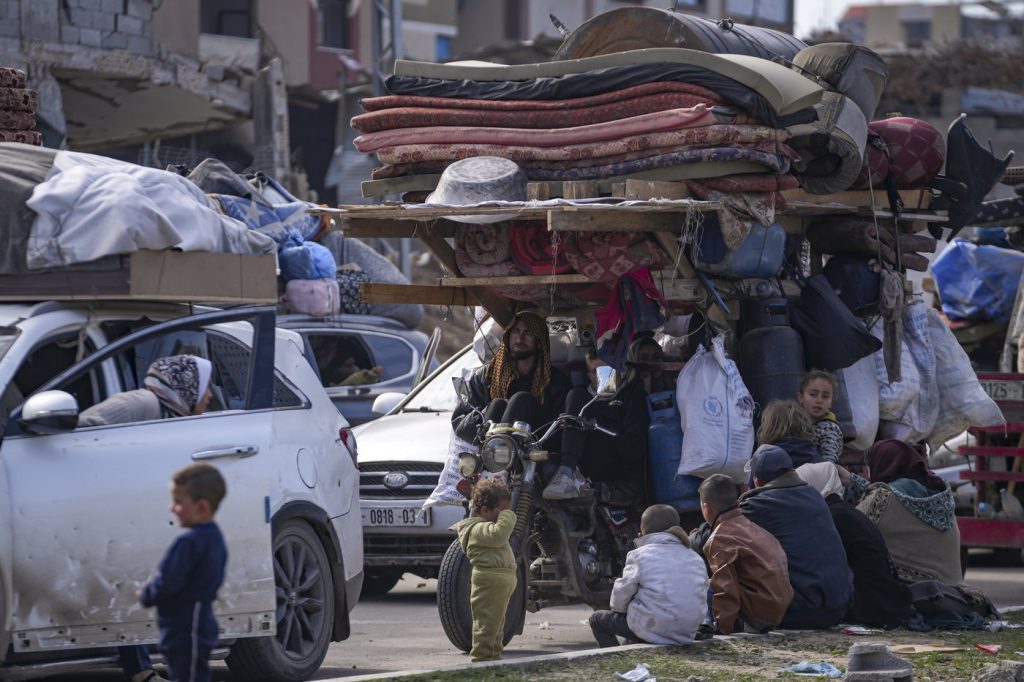DEIR AL-BALAH, Gaza Strip (AP) — A Palestinian man was reportedly killed, and seven others were injured overnight due to Israeli gunfire, according to local health officials on Sunday. This incident occurred as thousands of displaced individuals hoped to return to the northern Gaza Strip amidst a fragile ceasefire that began over a week ago, aimed at ending the ongoing conflict.
In a separate statement, President Donald Trump suggested that a significant portion of Gaza's population should be temporarily resettled elsewhere, potentially in Egypt and Jordan, referring to the action as a way to "just clean out" the war-torn region. However, this proposal has been met with rejection from Egypt, Jordan, and Palestinians, who fear that Israel might not permit the return of the refugees.
As part of the ceasefire agreement, Israel had intended to allow Palestinians to walk back to their homes in northern Gaza through the so-called Netzarim corridor. However, Israel delayed this movement until a hostage, who was meant to be released, was freed by Hamas. Crowds of people, carrying their belongings, gathered at a major road leading to a closed Israeli checkpoint. Nadia Qasem, a woman displaced from northern Gaza, expressed her distress, stating, "We have been in agony for a year and a half," indicating their long wait to return since 1 a.m.
Similarly, displaced citizen Fadi al-Sinwar highlighted the critical situation, where the fate of over a million people seemed contingent on one hostage's status, reiterating, "See how valuable we are? We are worthless."
The ongoing spat regarding the ceasefire has also led to violence; a man was shot, and two others sustained injuries late Saturday; according to Awda Hospital, another five individuals, including a child, were wounded early Sunday in different shooting incidents. There has yet to be any immediate comment from the Israeli military concerning these events.
As part of the ceasefire, Israeli forces have retreated from several regions of Gaza, but warnings remain in place for individuals to keep clear of the military, which continues to operate in a buffer zone along the border and within the Netzarim corridor. Hamas released four young female Israeli soldiers on Saturday, while Israel responded by releasing approximately 200 Palestinian prisoners, the majority serving life sentences for serious offenses.
However, due to the absence of the expected releasing of the female civilian hostage Arbel Yehoud, Israel has stated it would not open the Netzarim corridor until her release. The Israeli military also claimed that Hamas failed to provide adequate information regarding the upcoming releases of hostages over the next weeks. The United States, Egypt, and Qatar, which helped mediate the ceasefire, are actively working to resolve this dispute.
The ceasefire, established after extensive negotiations lasting over a year, is designed to put an end to a 15-month conflict triggered by Hamas' attack on October 7, 2023, which resulted in the hostage crisis and extensive violence. An estimated 90 hostages remain in Gaza, with Israeli authorities believing that a significant number—between one third and half—of these hostages were either killed during the initial assault or died while in captivity.
The initial phase of the ceasefire is set to last until early March, with goals to release a total of 33 hostages and nearly 2,000 Palestinian prisoners. The second phase, which is more complicated, is yet to be negotiated, as Hamas has made it clear it will not free remaining hostages unless the war comes to an end. Conversely, Israel threatens to renew its military campaign until Hamas is definitively defeated.
The violence initiated by Hamas' attack resulted in roughly 1,200 fatalities, mainly civilians; the group also abducted around 250 individuals, with over 100 previously released during a week-long ceasefire in November 2023. Israeli military operations have reportedly resulted in over 47,000 Palestinian fatalities, predominantly women and children, although specific combatant numbers remain unclear. The Israeli military claims to have killed around 17,000 militants but has not substantiated these figures.
Continued Israeli strikes and ground operations have massively devastated Gaza, leading to the displacement of around 90% of its 2.3 million inhabitants. Many returning to their neighborhoods post-ceasefire have been met with only debris where their homes previously existed.










